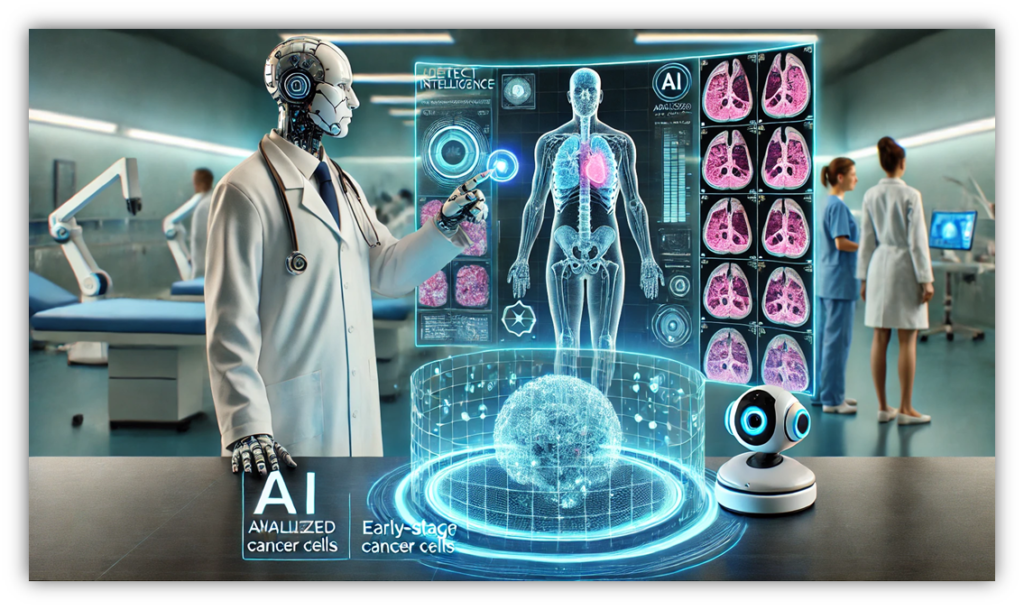In a quiet room at a research hospital in Bengaluru, an artificial intelligence system scans thousands of mammogram images within seconds, flagging subtle abnormalities that human eyes might miss. In another lab in Delhi, an AI tool cross-references pathology slides and genetic data to identify early-stage lung cancer — all before a doctor has even reviewed the case.
Across India and around the world, AI is no longer a futuristic concept in healthcare — it’s here, and it’s changing the way cancer is diagnosed.
With the promise of faster, more accurate, and earlier detection, artificial intelligence is now playing a critical role in identifying cancers at stages when they are most treatable. From breast and lung cancer to cervical and prostate malignancies, AI-driven diagnostic tools are helping clinicians overcome traditional bottlenecks and improving patient outcomes in a healthcare system often burdened by delays and shortages.
From Detection to Prediction
AI-powered algorithms — trained on vast datasets of imaging scans, clinical histories, and molecular profiles — are now being used to flag abnormalities that may signal cancer even before symptoms appear. These tools are being integrated into radiology, pathology, and genomic analysis, often outperforming traditional methods in speed and precision.
“AI has the capacity to identify patterns in imaging data that radiologists might overlook, especially in early-stage cancers,” said Dr. Neha Arora, a radiologist at Tata Memorial Hospital, Mumbai. “It doesn’t replace the physician — it enhances their ability to make accurate and timely decisions.”
In one study conducted by MIT and Harvard, an AI system analyzing mammograms predicted breast cancer up to five years in advance with nearly 90% accuracy. Closer home, India-based startups like Niramai and Qure.ai are pioneering low-cost, AI-enabled diagnostic solutions tailored for resource-limited settings.
Bridging the Diagnostic Gap
India’s cancer burden is rising rapidly, with over 1.5 million new cancer cases expected annually by 2030, according to the Indian Council of Medical Research (ICMR). Yet, a shortage of oncologists and diagnostic infrastructure continues to delay detection and treatment.
AI offers a scalable solution. In rural and underserved areas, where access to trained specialists is limited, AI-enabled tools can serve as the first line of detection, guiding clinicians toward appropriate referrals and interventions.
“In districts with no oncologist for miles, AI can act as an early warning system,” said Dr. Abhinav Sharma, a public health researcher at AIIMS Delhi. “That’s a game-changer in the Indian context.”
Challenges and Ethical Considerations
Despite its promise, AI in diagnostics is not without challenges. Concerns remain around data privacy, algorithmic bias, and the need for regulatory oversight. Models trained primarily on Western populations may not always translate well to diverse Indian genetic and imaging profiles.
Moreover, experts stress that AI must remain a supportive tool — not a substitute — for clinical judgment. “A human doctor brings context, empathy, and nuance that machines don’t,” said Dr. Arora. “AI should assist, not decide.”
India’s Health Ministry is currently exploring guidelines for ethical deployment of AI in healthcare, including quality benchmarks and audit trails.
A Future of Faster, Fairer Care
As more hospitals adopt AI-powered diagnostics, the impact is already being felt. Faster triage, fewer missed cases, and improved accuracy are saving lives and reducing the burden on overworked medical staff.
For patients, the benefits are profound: earlier diagnosis means more treatment options, lower costs, and better survival rates.
“We are at the beginning of a medical revolution,” said Dr. Sharma. “If implemented thoughtfully, AI can help democratize healthcare — making world-class cancer detection accessible to every Indian, regardless of where they live.”


